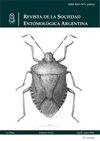Epormenis cestri Berg(半翅目:扁蝶科)的时间动态及其与Entre Rios滨海景观成分的关系
IF 0.5
4区 农林科学
Q4 ENTOMOLOGY
引用次数: 0
摘要
这种被称为“河流病”(MDR,西班牙语缩写)的疾病是蜜蜂未成熟阶段的一种中毒,由Sebastiania Spreng属的一种化合物引起,并集中在Epormenis cetri Berg的分泌物中。我们的目标是确定E.cetri生命周期的时间动态,它与主要植被成分的关系,以及乌拉圭河对其种群规模的影响。为此,我们选择了乌拉圭河附近的5个地点,在那里使用为此目的改进的Stem tap技术对E.cesteri种群进行了采样。利用GLMM评价了景观成分对E.cetri丰度的影响。经确定,E.cesteri蛋的孵化时间为10月中旬,发现其表型分布交错。此外,我们发现埃斯皮纳尔森林覆盖率和与乌拉圭河岸距离的增加对E.cetri的总丰度产生了显著的负面影响。这项工作为理解景观的组成部分如何构成E.cestri种群提供了一些初步线索,从而可以预测MDR发生的关键时刻。本文章由计算机程序翻译,如有差异,请以英文原文为准。
Temporal dynamics of Epormenis cestri Berg (Hemiptera: Flatidae) and its association with the landscape components of the Entre Rios Littoral
The condition called "river disease" (MDR by its acronym in Spanish) is an intoxication in immature stages of honey bees caused by a compound from the genus Sebastiania Spreng and concentrated in the exudates of Epormenis cestri Berg. Our objective was to determine the temporal dynamics of the life cycle of E. cestri, its association with the predominant vegetation components and the influence of the Uruguay river on the size of its populations. With this aim, we selected 5 sites in the vicinity of the Uruguay river where populations of E. cestri were sampled using the Stem-tap technique modified for this purpose. The effect of landscape components on the abundance of E. cestri was evaluated using GLMM. It was determined that the hatching of the E. cestri eggs was in mid-October, finding a staggered distribution of its phenophases. In addition, we found significantly negative effects of the Espinal forest cover and the increase in the distance from the banks of the Uruguay river on the total abundance of E. cestri. This work shows some first clues for the understanding of how the components of the landscape structure the populations of E. cestri, allowing to predict the critical moment of incidence of MDR.
求助全文
通过发布文献求助,成功后即可免费获取论文全文。
去求助
来源期刊

Revista De La Sociedad Entomologica Argentina
Agricultural and Biological Sciences-Insect Science
CiteScore
0.80
自引率
20.00%
发文量
31
审稿时长
20 weeks
 求助内容:
求助内容: 应助结果提醒方式:
应助结果提醒方式:


